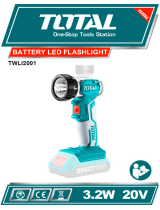
4 English
SAFETY WARNINGS
IMPORTANT SAFETY
INSTRUCTIONS
WARNING:
When using electric tools, basic
safety precautions should always be followed to
reduce the risk of re, electric shock, and personal
injury, including the following:
READ ALL INSTRUCTIONS.
1. Do not look into the light, or do not expose the
light to eyes. Eyes may be damaged.
2. Do not cover or clog the lit tool with cloth or
carton, etc. Covering or clogging it may cause a
ame.
3. The tool is not waterproof. Do not use it in damp
or wet locations. Do not expose it to rain or
snow. Do not wash it in water.
4. Do not touch the inside of the ashlight head
with tweezers, metal tools, etc.
5. Do not give the tool a shock by dropping,
striking, etc.
6. When the tool is not in use, always switch off
and remove the battery cartridge from the tool.
7. Battery tool use and care
• Prevent unintentional starting. Ensure the switch
is in the off position before connecting to battery
pack, picking up or carrying the machine. Carrying
the appliance with your nger on the switch or
energizing appliance that have the switch on invites
accidents.
• Disconnect the battery pack from the appliance
before making any adjustments, changing
accessories, or storing machine. Such preventive
safety measures reduce the risk of starting the
appliance accidentally.
• Recharge only with the charger specied by the
manufacturer. A charger that is suitable for one type
of battery pack may create a risk of re when used
with another battery pack.
• Use appliance only with specically designated
battery packs. Use of any other battery packs may
create a risk of injury and re.
• When battery pack is not in use, keep it away
from other metal objects, like paper clips, coins,
keys, nails, screws or other small metal objects,
that can make a connection from one terminal to
another. Shorting the battery terminals together may
cause burns or a re.
• Under abusive conditions, liquid may be ejected
from the battery; avoid contact. If contact
accidentally occurs, ush with water. If liquid
contacts eyes, seek medical help. Liquid ejected
from the battery may cause irritation or burns.
• Do not use a battery pack or appliance that is
damaged or modied. Damaged or modied
batteries may exhibit unpredictable behaviour
resulting in re, explosion or risk of injury.
• Do not expose a battery pack or appliance to
re or excessive temperature. Exposure to re
or temperature above 130°C (265°F) may cause
explosion.
• Follow all charging instructions and do not
charge the battery pack or appliance outside
of the temperature range specied in the
instructions. Charging improperly or at temperatures
outside of the specied range may damage the
battery and increase the risk of re.
• Have servicing performed by a qualied repair
person using only identical replacement parts.
This will ensure that the safety of the product is
maintained.
• Do not modify or attempt to repair the appliance
or the battery pack except as indicated in the
instructions for use and care.
• Do not dispose of the battery(ies) in a re. The
cell may explode. Check with local codes for possible
special disposal instructions.
• Do not open or mutilate the battery(ies). Released
electrolyte is corrosive and may cause damage to the
eyes or skin. It may be toxic if swallowed.
• Do not charge battery in rain, or in wet locations.
• Do not handle charger, including charger plug,
and charger terminals with wet hands.
• Do not charge the battery outdoors.
Important safety instructions for
battery cartridge
1. Before using battery cartridge, read all
instructions and cautionary markings on (1)
battery charger, (2) battery, and (3) product using
battery.
2. Do not disassemble battery cartridge.
3. If operating time has become excessively
shorter, stop operating immediately. It may result
in a risk of overheating, possible burns and even
an explosion.
4. If electrolyte gets into your eyes, rinse them out
with clear water and seek medical attention right
away. It may result in loss of your eyesight.
5. Do not short the battery cartridge:
(1) Do not touch the terminals with any
conductive material.
(2) Avoid storing battery cartridge in a container
with other metal objects such as nails, coins,
etc.
(3) Do not expose battery cartridge to water or
rain.
A battery short can cause a large current
ow, overheating, possible burns and even a
breakdown.
6. Do not store the tool and battery cartridge in
locations where the temperature may reach or
exceed 50 °C (122 °F).
7. Do not incinerate the battery cartridge even if it
is severely damaged or is completely worn out.
The battery cartridge can explode in a re.
8. Be careful not to drop or strike battery.
9. Do not use a damaged battery.







